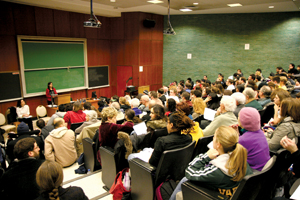
A Binghamton University professor said people only attend events like the Israeli-Palestinian panel discussion, which occurred last week, for two reasons: either to get their beliefs confirmed by the speaker, or to say how biased the discussion is.
“Do people’s minds get changed through this?” asked panelist Jonathan Karp, associate professor of history and Judaic studies at BU.
“Understanding the Conflict: Israel’s War on Gaza,” packed Science I, room 149 on Thursday night. Sparks flew as four panelists discussed their opinions on the Gaza war for 15 minutes each, followed by a question-and-answer session.
“Three well-renowned speakers are telling the story of what’s happening in Gaza,” Lior Marko, a junior political science major, said. “But it’s only one side of the story — it’s very biased.”
However, fourth year anthropology Ph.D. candidate Maria Starzmann said she did not think it was biased.
“We tried to have this as a conversation,” Starzmann said. “Many people think it’s one-sided because there’s three Arab names, but that’s not the case.”
BU anthropology professor Susan Pollock served as the moderator of the event. She began the discussion by introducing each of the panelists, and explained her hopes that the audience would treat each with respect.
Omar Baddar, executive director of the Massachusetts American-Arab Anti-Discrimination Committee, was the last panelist to speak. He said the media framed the recent Gaza offensive in the wrong context, by placing the blame solely on Hamas.
However, Baddar said, the proper equation would be Israel saying, “We’re going to take your water, bomb your cities and kill your people whether you cooperate or not.”
According to Baddar, Israel violated the cease-fire seven times before Palestine used any rockets.
“The problem is that when Israel was supposed to be withdrawing troops, they were doing just the opposite,” he said.
Karp said he didn’t think he would be the panelist to come to Israel’s defense when he first signed up for the discussion. Karp is known for being a Zionist critic and said he does condemn Israel’s recent attack.
“Hamas refused to recognize Israel as a Jewish state and is Israel’s enemy,” he said. “I believe they should be everyone’s enemy, no matter what their identity is.”
According to Nada Khader, a Palestinian-American activist and executive director of the Westchester People’s Action Coalition, a Palestinian solidarity activist isn’t against Israel or the Jewish people.
“It’s a vision of Israel where it treats all of its people with equality,” she said.
Khader said land is not meant to be bought or sold; rather, it is there to nourish and take care of people.
Ali Mazrui, director of the Institute of Global Cultural Studies at BU, said he believed Israel is reshaping the idea of Zionism. The “Israel war machine,” Mazrui said, is making a bad name of its people and the Jews. Mazrui said that, within the context of the Gaza war, Israel is viewed as a bully.
Baddar said Americans need to pressure Israel to make sure that peace can happen.
“A stable Middle East is something the U.S. wants, too,” he said.


